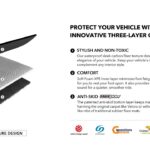More than half a century after the iconic coupe first hit the roads, the Ford Mustang continues to captivate car enthusiasts globally, witnessing a surge in demand even in recent years. However, the automotive world is evolving, and Ford is boldly stepping into the electric era with a vehicle that might surprise purists and excite a new generation: the all-electric Mustang SUV.
While details have been scarce since the initial announcement at the 2018 North American International Auto Show in Detroit, Ford has recently offered a tantalizing glimpse of this groundbreaking model. A short teaser video showcases a camouflaged prototype undergoing rigorous testing at the Smithers Winter Test Center, located approximately 400 miles north of Detroit. This move is part of Ford’s strategy to proactively address what they identify as “EV misconceptions,” aiming to alleviate potential buyer concerns about electric vehicles before the New Mustang Suv’s anticipated market debut next year. These misconceptions include anxieties surrounding cold weather performance, driving range, the accessibility of public charging infrastructure, and overall vehicle performance.
Ford’s early forays into the electric vehicle market included a range of hybrids, plug-in hybrids, and battery-electric vehicles. However, these initial models were often criticized for delivering underwhelming performance, particularly with BEVs struggling to exceed a mere 100 miles on a single charge.
The new Mustang SUV is poised to shatter these previous limitations. Industry projections suggest a significantly improved range of 300 to 373 miles on a single charge, depending on the chosen battery pack option. Coupled with the rapidly expanding network of high-speed public charging stations, Ford, alongside competitors such as Tesla, General Motors, and Audi, is optimistic that the specter of “range anxiety” will soon become a relic of the past for EV drivers.
Furthermore, Ford’s strategic decision to associate this electric SUV with the legendary Mustang nameplate is a clear signal of their performance intentions. The message is unmistakable: this electric SUV is engineered to deliver exhilarating, neck-snapping acceleration and driving dynamics.
Hau Thai-Tang, Ford’s Executive Vice President of Product Development, articulated this performance-centric approach, stating, “Selling electrification on just fuel efficiency is not going to pay out when gas is going for $2.50 a gallon.” This underscores Ford’s understanding that in a competitive market, electric vehicles must offer more than just environmental benefits; they must also deliver a thrilling driving experience.
This strategic shift towards performance in the EV sector is not unique to Ford. Tesla pioneered this approach with the introduction of its “Ludicrous Mode” on the Model S, captivating a performance-focused audience. Similarly, Porsche recently unveiled the Taycan electric sports car, boasting an astonishing 0-60 mph acceleration time of just 2.6 seconds, further solidifying the performance potential of electric powertrains.
While it remains to be seen if the Ford battery SUV will reach these stratospheric performance figures, the inherent nature of electric motors, delivering instant maximum torque, suggests it will offer a compelling performance profile. It could even rival the sportiest iterations of the traditional gasoline-powered Mustang, such as the formidable 760-horsepower Shelby GT500, which is slated to arrive in the market shortly before its electric counterpart.
The “Mustang-inspired” SUV is expected to debut around the same time as a potentially significant rival, the Tesla Model Y sport-utility vehicle. Looking ahead, the electric vehicle market is on the cusp of explosive growth, with a plethora of new models anticipated within the next 12 to 18 months. Audi has already launched its inaugural BEV, the e-tron SUV, and Porsche’s Taycan is poised to follow suit. Major automakers including General Motors, Fiat Chrysler, Volkswagen, and virtually every other manufacturer are actively developing comprehensive battery car programs.
Ford’s commitment to this electric future is substantial, with an investment of $11 billion earmarked for its EV initiatives. This figure excludes the $500 million investment announced last spring in Rivian, a Michigan-based electric vehicle startup. Furthermore, Ford has forged a strategic alliance with Volkswagen to pool resources in EV research and development, including sharing the electric vehicle architecture that will underpin numerous future VW models.
The ultimate challenge for Ford, and indeed for the entire industry, is market acceptance. Despite Tesla’s impressive sales figures for the Model 3 electric sedan, plug-in vehicles currently constitute a mere fraction – approximately 2 percent – of the U.S. automotive market. Ford acknowledges that “education” will be paramount in overcoming consumer reservations about EVs. However, compelling product offerings will be equally critical. The automaker is placing a significant bet that the electric Mustang SUV, set to be fully unveiled later this year, will be precisely the compelling product needed to accelerate EV adoption and redefine the Mustang legacy for the electric age.

